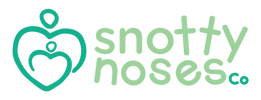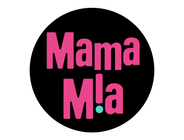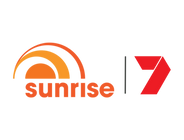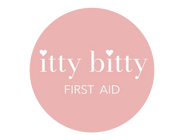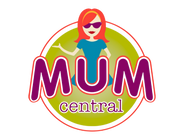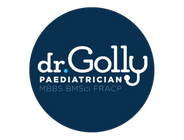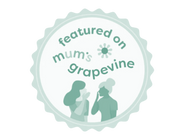It's a question we get asked a lot. And it's vital information for parents.
Dr Nina Shapiro advises that babies are "obligate nasal breathers" meaning they prefer to breathe oxygen through their nose.
In fact, nose breathing is the way all humans are designed to absorb the most oxygen.
Mouth breathing is 'technically' possible for babies, but it's a very poor back up method (and can pose serious long term health and developmental issues).
In makes sense, when you think about what babies do in their first few months:
- Their mouth is for drinking milk (breast or bottle), crying and cooing
- During feeding, the mouth is filled by breast or bottle, so it's absolutely vital a baby can breathe oxygen through their nose.

Why Is Nasal Breathing Best?
Nasal breathing of oxygen is best for babies because it filters, warms, humidifies and delivers oxygen more efficiently while boosting nitric oxide, supporting calmer breathing, better sleep and healthier airway development.
What is Nitric Oxide and Why Is It So Important?
When your baby breathes through their nose, their tiny nasal passages naturally produce a gas called nitric oxide (not to be confused with nitric acid!).
Nitric oxide is a powerful, beneficial gas made only in the nose — not through mouth breathing — and it plays a key role in keeping your baby’s body healthy.
1. Boosts Oxygen Absorption
Nitric oxide widens (dilates) the airways and the blood vessels in the lungs.
➡️ This allows more oxygen to transfer into the bloodstream.
Babies already breathe fast and shallow, so anything that improves oxygen uptake is gold.
2. Helps Kill Germs
Nitric oxide has antiviral, antibacterial and antifungal properties.
➡️ It helps neutralise pathogens in the nose before they reach the lungs.
For sick babies, this is a huge protective mechanism.
3. Reduces Inflammation
Nitric oxide acts as a signalling molecule that calms inflammation in the airways.
➡️ This helps prevent swelling, congestion and tightness in the lungs.
4. Supports Lung Development
In infants, nitric oxide helps regulate healthy blood flow in the lungs and supports lung growth.
➡️ This is why hospitals often use inhaled nitric oxide therapy for premature babies with breathing difficulties.
5. Promotes Healthy Sleep + Breathing Patterns
Nasal breathing activates the parasympathetic (“rest & calm”) nervous system.
➡️ Babies settle easier, sleep more rhythmically and breathe more efficiently.
A Blocked Nose is Dangerous and Uncomfortable
A blocked nose from congestion can severely compromise the health and comfort of your baby. It is their natural preference and physiological reflex to breathe through their nose.
If the nasal passage is blocked, it can be dangerous and uncomfortable.
The Risk of Long Term Mouth Breathing
When a baby breathes through their mouth:
❌ Little to no nitric oxide is delivered to the lungs
❌ Less oxygen absorption to body
❌ Higher chance of inflammation and disrupted sleep
❌ Mouth breathing bypasses the nose’s immune filter, so more irritants reach the throat and lungs.
❌ Less oxygen delivery affects the developing brain, and is linked to poor concentration, hyperactivity, irritability, learning difficulties
Does Mouth Breathing Increase Cortisol or Stress on the Body?
Mouth breathing activates the stress response. When a child mouth breathes, they tend to breathe:
-
faster
-
shallower
-
more from the chest
This pattern signals the brain that the body is in a fight-or-flight state. That activates the sympathetic nervous system, which increases cortisol (the stress hormone).
Nasal breathing does the opposite — it stimulates the calming parasympathetic system.
Babies Can't Blow Their Own Nose
We now understand the medical and physiological benefits of nasal breathing.
However, there is a major problem when babies are sick and have nasal congestion: they can't blow their own nose.
Blocked and runny noses are a cause of discomfort for babies, and can pose a serious medical risk.
Parents feels stressed and uncertain when their baby is struggling to breathe.
In the past, the only options to clear a little nose were
- wiping surface snot with tissues
- using a nasal spray
- suctioning with the parent's mouth
- using a manual suction bulb or tube.

New Technology to The Rescue
In the last 15 years, motorised nasal aspirators have been invented, for safe home use. These 'snot suckers' allows parents to safely and effectively suction nasal mucus, so the nostrils are clear, and babies can breathe easier.
How To Clear A Blocked Nose
Parents can flush out and clear the nasal passages as quickly as possible, and as often is needed.
A 2-step process is recommended:
Step 1. Flushing each nostril with 2-3 squirts of saline spray. Saline spray is natural, purified salt water. Saline has no medical or chemical dangers, so is safe to use daily from birth. Breastmilk is mother nature's saline, as is an excellent alternative to store bought saline.
Step 2. Clearing and removing all excess mucus in a few seconds via a high quality motorised suction device, like the award winning Snotty Boss Aspirator

Baby Humidifiers
A baby's sleep environment plays a huge part in their ability to breathe through their nose - particularly if airconditioners or heaters are being used in the room, as they severely reduce humidity.
Dry mouth and nose can cause early waking.
As well as keeping little noses clear with a nasal aspirator, hydrating the air with a cool mist vaporiser/diffuser also promotes good health and good sleep.
The team at Rhythm First Aid Australia and Itty Bitty First Aid acknowledge that humidified air helps sick babies breathe easier.
Plain tap water can be safely turned into water vapour in the ultrasonic vaporiser/humidifier from birth, and a few drops of organic essential oil, like lavender, lemon and chamomile can be added from around 3 months.
Read more on diffusing essential oils with babies here.

Purify and hydrate the air 365 nights a year for better health and sleep with HUSH
Baby's Breathing Changing Over Time
Around the age of 5 months, rapid physical growth moves the soft palate and epiglottis further apart, which allows your baby more freedom to breathe through the mouth.
Although they can technically alternate between nasal and mouth breathing from this age, children (and adults) continue to show a preference for nasal breathing.
Nasal breathing is a key indicator of good health, and should be optimised from birth.
Read the hundreds of testimonials and see why 1000s of Australian families use and trust our products. They will become a key part of your daily well-being routine for your baby, toddler and child.
Much love
Laura and the team, Brisbane xx

Disclaimer: Our products are offered for sale with general use guidelines provided by the manufacturer. Should any sensitivity to our products occur, please discontinue use.
We are not doctors or healthcare professionals or aromatherapists. Our products are not intended to diagnose, treat, and/or take the place of medical treatment prescribed by a doctor or medical professional.

